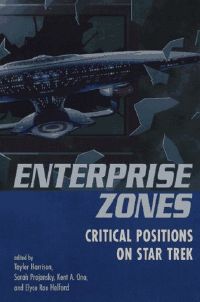Enterprise Zones: Critical Positions on Star Trek
Das Buch Enterprise Zones: Critical Positions on Star Trek enthält eine Sammlung verschiedener Essays zum Thema Star Trek.
Inhalt[Bearbeiten]
- Vom Umschlagtext:
Can you imagine a world without Star Trek – without warp drive, phasers, photon torpedoes, tricorders, communicators, and transporters? After six Hollywood movies and twenty-five years of nonstop television presence, Star Trek is, indeed, a pervasive cultural phenomenon! This is the first critical, scholarly look at the mysteries, hidden meanings, and complex issues of the text known as Star Trek.
Looking at the original Spock-Kirk Star Trek, the contributors ask and answer questions such as: What are the cultural conditions surrounding the homoerotic relationship between Kirk and Spock? How does the show depict gender relations while simultaneously recreating the cultural conditions under which women continue to experience sexual aggression and violence? They also explore Star Trek: The Next Generation, raising issues such as: Was Data a battlefield on which the struggle for human rights was waged? Did militarism and warring versions of masculinity intersect at Worf?
Readers will discover the unique charges of cultural studies scholarship and how it enables us to designate a powerful pop-cultural phenomenon such as Star Trek into a legitimate site of study. The thirteen essayists address the very real and necessary topics of hegemony, utopias, militarism, colonialism, gender, violence, race, class, sexuality, and liminality, analyzing individual episodes and overarching themes of Star Trek and Star Trek: The Next Generation. Their insights on how Star Trek affects what we understand our culture to be, how it represents the social and political order, and how it reproduces pleasure and pain in its televisual texts, will fascinate scholars, students, and Trekkers alike.
